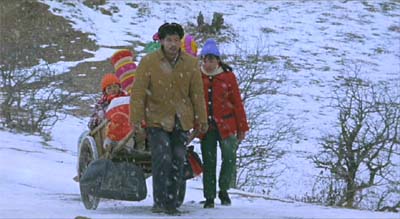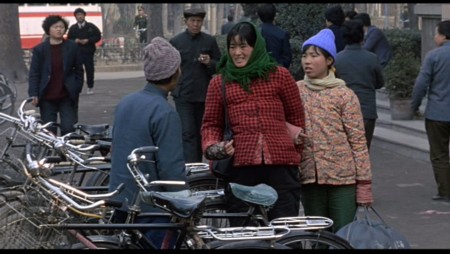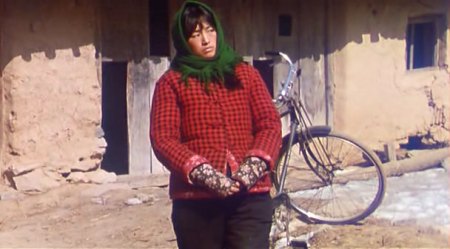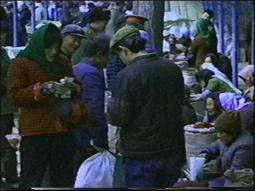From the Chicago Reader (May 28, 1993). — J.R.
THE STORY OF QIU JU
**** (Masterpiece)
Directed by Zhang Yimou
Written by Liu Heng
With Gong Li, Lei Lao Sheng, Liu Pei Qi, Ge Zhi Jun, and Yang Liu Chun.
For a comedy that takes bureaucratic negotiation as one of its overriding themes, Zhang Yimou’s The Story of Qiu Ju has negotiated quite a bit for its director from the Chinese government, bureaucracy and all. This is only one of the film’s many ironies. Another is that in the course of showing us much more of China’s particularity than ever before Zhang has realized his most universal and accessible film to date, offering a virtual reproach to the artiness of its predecessors.
Until this feature was made, Zhang’s previous two films, Ju Dou (1990) and Raise the Red Lantern (1991), both huge international successes, were banned in China. Zhang was widely regarded as both a dissident and a scandalous figure, thanks to his adulterous relationship with his leading lady, Gong Li (who has played in all five of his features), which was given much publicity in abusive newspaper articles under the byline of his estranged wife. At least one semireliable commentator thinks it may have been this scandal more than the political meanings of Ju Dou and Raise the Red Lantern (dramas about the persistence of Chinese feudalism set in the early part of this century) that led to their suppression.
In any case, the vastly different, nonperiod The Story of Qiu Ju has so delighted the government bureaucrats that despite its Hong Kong financing it’s now fictitiously labeled a coproduction of the Beijing Film Academy’s Youth Film Studio. Zhang’s last two features, already unofficially available to Chinese film-industry professionals on video, can now be seen by China’s general public, and after Qiu Ju won the top prizes for best picture and best actress at last year’s Venice film festival, the government hosted a grand banquet honoring the director (who had meanwhile married Gong Li).
It’s the sort of success story that would seem to justify a certain skepticism, roughly along the lines of that we might feel toward Eisenstein’s relatively kitschy Alexander Nevsky, beloved by Joseph Stalin — especially in light of the filmmaker’s previous masterpieces of montage (Strike, Potemkin, October, The General Line). Can a movie that so pleases a repressive ruling regime possibly be all good?
Yet it’s also possible that Zhang’s international fame and stature, which have almost single-handedly placed Chinese cinema on the map, made some adjustment in governmental policy obligatory. And Zhang’s decision to make his latest picture with and about peasants may represent not so much a compromise as a face-saving point of agreement with official policies that allowed a certain rapprochement to take place.
I can’t pretend to be able to decode all the ambiguities of this marriage between artistic impulses and political expediency. But I’d like to suggest that the Yankee bias that says these two things are at variance with each other — that “natural” artistic interests usually run counter to ideological agendas — is every bit as much an ideological construction as the Chinese Marxist assumption that art and politics are one and the same. (It’s an intrinsic aim of capitalist propaganda in even its coarsest forms, such as Indecent Proposal and Hot Shots! Part Deux, to be perceived simply as “good clean fun,” miraculously free of ideology.) It also seems worth arguing that, contrary to much of what one reads about The Story of Qiu Ju, the pronounced stylistic shift it represents in Zhang’s work can’t really be called a move away from art; rather it dramatizes a shift of focus from the upper classes to the lower, necessitating a very different definition of what art is and can be.
The plot concerns the efforts of a tenacious, pregnant farm wife (Gong Li), the title heroine, to redress an injustice: her husband (Liu Pei Qi) has been kicked in the balls and ribs by the village chief (Lei Lao Sheng) following an altercation about the proposed building of a storage shed adjacent to the couple’s chili fields, during which the husband taunted the chief about his lack of a male heir. (The chief has four daughters — three more children than he’s officially allowed — but the almost universal preference for boys over girls in Chinese peasant families makes the husband’s alleged remark about the chief having “hens” instead of heirs especially insulting.)
Sony Pictures, the distributor, is billing this film as a “revenge comedy,” in keeping with Yankee tastes — which is almost as misleading as American critics comparing Ju Dou to The Postman Always Rings Twice. In fact, Qiu Ju’s elaborate appeals to local, county, and city officials and finally to a court of law (when she sues the government) aren’t a grudge match as we would ordinary understand it. What she’s seeking is not precisely an apology, punishment for the chief, or monetary compensation for the wrong done to her husband, but a shuafa — a Chinese term that I’m told means an answer, explanation, or clarification. What she seems to be asking for, in short, is something closer to what Zhang recently received, thanks to his efforts, from the same bureaucracy: a respectful acknowledgement.
My limited knowledge of Chinese art comes mainly from a few hours spent at the world’s best and largest Chinese art museum, in Taipei, in late 1991. Most of this awesome collection was moved there from Beijing’s Forbidden City at the end of World War II for fear the Communists would destroy it. The reason for this fear becomes apparent as soon as one considers that art as we understand it — and as Taipei’s National Palace Museum defines it — is something that existed in China exclusively for emperors and their families and friends, not for the general public. I’m too much of a novice on the subject of Chinese peasant art to know what it consisted of prior to the communist revolution, but whatever it was it wasn’t found in any museums.
Given that Chinese culture is overwhelmingly a peasant culture, these considerations seem fundamental to any understanding of Chinese cinema, including the work of an exceptional director like Zhang Yimou. Zhang’s five features as a director — all made after he worked as a still photographer, then served as cinematographer on One and Eight (1982), Yellow Earth (1983), The Big Parade (1985), and Old Well (1987), in which he was also the lead actor — are the three features already mentioned, Red Sorghum (1987), and a period action thriller with political overtones about an airplane hijacking known as Code Name Puma or Code Name Cougar (1987), which has rarely been imported (and which colleagues have assured me isn’t very good).
All five films feature Gong Li, and all of them, barring only the thriller, center in one way or another on the oppression of women. But prior to The Story of Qiu Ju none of them had much to do with Chinese peasant culture, and none of them had a contemporary setting. (The principal and spatially limited vantage points of Red Sorghum, Ju Dou, and Raise the Red Lantern are those of people with property — enclosed fortresses of one sort or another where allegorical tragedies get played out.)
This isn’t too surprising given Zhang’s own background. He was born into a professional family near Xi’an in 1952; his mother was a dermatologist, and his father had no regular job because he’d been an officer in the Kuomintang army prior to the communist takeover in 1949. During the Cultural Revolution Zhang was sent first to a village north of Xi’an to work on a farm, then to a city in the northwest, where he worked as a laborer in a cotton mill. There he sold his blood to purchase a still camera.
When the Beijing Film Academy reopened in 1978, after being closed for a dozen years, Zhang passed the entrance exam with high marks, but at 27 he was five years over the age limit for entering students. He was accepted only after two unsuccessful trips to Beijing, followed by a letter of entreaty to the director of the ministry of culture — a bureaucratic quagmire that doesn’t seem unrelated to the obstacles faced by Qiu Ju. There’s also a parallel between Qiu Ju’s situation and the absence of any explanation from the Chinese censors about the banning of Ju Dou and Raise the Red Lantern, though one probably shouldn’t take this autobiographical reading too far. As Zhang himself has said, “It does not matter whether I am Qiu Ju or whether her story is like mine, since this is a very ordinary story that happens all the time in China.”
Nearly half of The Story of Qiu Ju was shot with hidden cameras to capture everyday village, town, and city street life without provoking the self-consciousness usually seen in nonprofessionals when they’re filmed, and related strategies were used in interior scenes to give the performances an unforced flow. (Obviously Chinese filmmakers don’t have to worry about clearance from unwitting extras — not to mention conscious ones.)
Shifting the action of a novel by Chen Yuan Bin from southern to northern China — specifically to the region where Zhang was born and grew up — the director and his screenwriter, Liu Heng, created a loose enough framework to allow for improvised contributions from many of the people involved. And in keeping with Maoist principles about the proper role of intellectuals, the director, five professional actors, and a skeleton crew all wound up living for eight months with peasants in the village where they filmed.
The results of these strategies are palpable. While some critics have suggested some aesthetic losses relative to Zhang’s more obviously formalized previous features, I think this is his most richly textured work to date. If the beauty of certain shots is less readily apparent than that of some in Red Sorghum, Ju Dou, and Raise the Red Lantern, this is largely because the story-telling functions of such shots are more fully integrated into the film’s overall rhythm and design. We’re never asked to stop and admire the attractiveness of certain colors and compositions, as we are in the earlier movies, not only because the camera style usually throws us straight into the bustling middle of every scene, but also because the content — the information we’re given about contemporary Chinese life — is much more densely flavored. (Just the same, there are establishing shots of landscapes and framings of groups in interiors that are as lovely as anything in the previous films, even if they’re signaled less ostentatiously.) The ease with which Zhang realizes all this, its flow and lucidity, marks him as a master; by contrast his previous films, for all their genuine achievements as visual inventions and social allegories, seem almost like the work of a promising dilettante. Even the final sequence, which has been criticized by some as an unnecessary or melodramatic plot contrivance, can be defended as a beautifully executed philosophical coda that gives a thoughtful, ironic twist to everything preceding it; it’s analogous in some ways to the last sequence in Truffaut’s The 400 Blows, which may well have inspired it. (Though the meaning and context are clearly different in Zhang’s hands, I can think of few uses of the freeze-frame close-up since Truffaut’s that are as strictly functional and justifiable.)
As a comic fable the film is distinctive largely for what it doesn’t show. With a few exceptions, all the major scenes — including the altercation with the village chief that sets the plot in motion, most of Qiu Ju’s key encounters with government officials and a city lawyer, and her eventual childbirth — are pointedly omitted, thereby allowing the textures of everyday life to assume the sort of importance they’re usually denied in movies.
The strongest dramatic encounter that’s included — the chief’s attempt to pay her the $200 the local Public Security Bureau chief (Ge Zhi Jun) has decided she and her husband are entitled to — tells us all we need to know about the mulish pride and (lurking in the background) old boys’ network she’s decided to challenge. Even here it’s the everyday details more than the exceptional behavior that winds up putting the scene across.
The chief tosses the 20 bills in the air, and after they flutter to the ground he proclaims, “Bow your head and pick them up. When you’ve bowed your head 20 times, we can call it quits.” “I’ll say when we quit,” she replies as she stalks off. The comic use of a dog in this scene and its eventual sequel, when the chief tries to pay her a larger sum in a more civil manner, is a good indication of how Zhang can often work wonders with whatever’s at hand; another is the homey exterior settings used for the two scenes — a gate outside a house and a sort of patio speckled with sun and shadow — that sculpt the action.
Part of Zhang’s satiric strategy is to treat none of the characters as a simple villain and everyone as a little bit absurd, the heroine included. Her own rural naivete becomes most apparent when she arrives in the big city with her sister-in-law (Yang Liu Chun) and they undergo the misadventures of rubes set loose in an urban pinball machine. Yet the film is never condescending to any of its characters; each is accorded moments of truth and dignity as well as a certain amount of ribbing.
The film’s integrity is chiefly a matter of countless small but uncommon observations, such as Qiu Ju’s inability to squat down on a bench at an outdoor restaurant because of her belly or the way she shyly confesses her illiteracy to a city official who wonders why she had to pay someone else to draft her letter of complaint. (Gong Li, in her first nonglamorous role, has never been half as good or resourceful before, and because she never takes Qiu Ju for granted, neither do we.) The brief scene with the letter writer, who cheerfully boasts about the life sentences and executions secured through his prose as he explains his fee scale, is another small gem.
Underneath all these epiphanies, implicit in the story rather than spelled out, are a few caustic ironies. While the film persuades us to admire Qiu Ju for her obstinacy and to regard her as something of a feminist heroine, the incident that motivates her crusade is sparked by a blatantly misogynist remark from her husband that she never considers or questions. The kindness and good intentions we see in all the Public Security Bureau officials she encounters finally have to be weighed against the sheer incompetence or irrationality of most of the decisions they arrive at, as well as the stubborn resistance to change that infects the entire bureaucracy. (Allegorically, at least, Zhang’s previous films implied certain criticisms of the Chinese state, but always within defeatist terms; this one suggests that change is theoretically possible, if difficult.)
Finally, the degree to which “justice” and face-saving become virtually interchangeable for all the characters at one point or another demonstrates the extent to which the whole system that’s being unpacked resides in the realm of the symbolic. Indeed, in a plot that occasionally calls to mind Heinrich von Kleist’s great early-19th-century novella Michael Kohlhaas, the protagonist’s widening circle of appeals and the responses they elicit finally demonstrate the romantic futility of achieving precise justice in any realm but the symbolic. The film suggests more than once that the whole ongoing mess of life itself — in constant flux and revision — seems to exist somewhere adjacent to the tortuous legal machinery, mocking its aspirations and confounding its pretensions at every turn.




